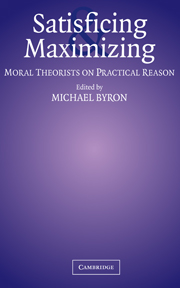Book contents
- Frontmatter
- Contents
- Contributors
- Introduction
- 1 Two Views of Satisficing
- 2 Satisficing as a Humanly Rational Strategy
- 3 Maxificing: Life on a Budget; or, If You Would Maximize, Then Satisfice!
- 4 Satisficing and Substantive Values
- 5 A New Defense of Satisficing
- 6 Satisficing: Not Good Enough
- 7 Why Ethical Satisficing Makes Sense and Rational Satisficing Doesn't
- 8 The Plausibility of Satisficing and the Role of Good in Ordinary Thought
- 9 Satisficing and Perfectionism in Virtue Ethics
- 10 Could Aristotle Satisfice?
- 11 How Do Economists Think About Rationality?
- Bibliography
- Index
10 - Could Aristotle Satisfice?
Published online by Cambridge University Press: 04 December 2009
- Frontmatter
- Contents
- Contributors
- Introduction
- 1 Two Views of Satisficing
- 2 Satisficing as a Humanly Rational Strategy
- 3 Maxificing: Life on a Budget; or, If You Would Maximize, Then Satisfice!
- 4 Satisficing and Substantive Values
- 5 A New Defense of Satisficing
- 6 Satisficing: Not Good Enough
- 7 Why Ethical Satisficing Makes Sense and Rational Satisficing Doesn't
- 8 The Plausibility of Satisficing and the Role of Good in Ordinary Thought
- 9 Satisficing and Perfectionism in Virtue Ethics
- 10 Could Aristotle Satisfice?
- 11 How Do Economists Think About Rationality?
- Bibliography
- Index
Summary
Introduction
It is widely known that Herbert Simon introduced the notion of satisficing in order to provide an alternative to maximizing conceptions of rationality. What may be less well understood is that he sought to avoid what were (to his mind) equally unpalatable treatments of practical reasoning. Simon observed that social scientists were divided in their treatment of rationality. Economists granted homo œconomicus an absurdly omniscient rationality. On the other hand, social psychologists often explained behavior solely in terms of affect, edging rationality out of the account.
Simon's account of rationality, in contrast, aims to stake out a middle ground by taking account of the ways in which human rationality is bounded, while eschewing the elimination of rationality in favor of affect. In particular, the bounds of our rationality include limitations on our knowledge of the consequences of our actions, ignorance regarding what value we will ultimately attach to those consequences we do foresee, and finite capacity to grasp the alternatives available in any choice situation. The decision rule Simon developed within this account of bounded rationality he called satisficing, and he contrasted it with maximizing, which, he claimed, only the unbounded rationality of homo œconomicus can even hope to attain.
The intuitive motivation for a satisficing decision rule is straightforward. If the rationality of homo œconomicus is not feasible for us, and if we wish to have some explicit standard of rational choice that is feasible for us, then we need a rule that presupposes a limited, bounded rationality.
Information
- Type
- Chapter
- Information
- Satisficing and MaximizingMoral Theorists on Practical Reason, pp. 190 - 212Publisher: Cambridge University PressPrint publication year: 2004
Accessibility standard: Unknown
Why this information is here
This section outlines the accessibility features of this content - including support for screen readers, full keyboard navigation and high-contrast display options. This may not be relevant for you.Accessibility Information
- 1
- Cited by
